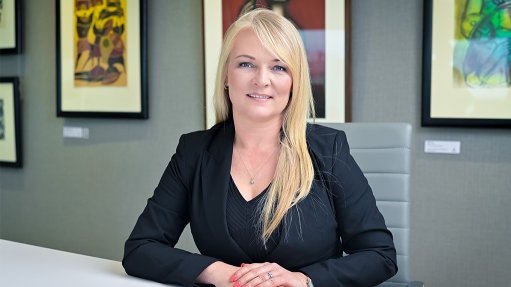
JSE primary markets business development manager Patrycja Kula-Verster
South Africa needs more funding mechanisms to support junior mining at an early stage of exploration, Bedrock Capital CEO Messu Mwaniki said on May 21 at the Junior Indaba in Johannesburg.
“I think by now we should have much more junior mining funds available, which can be seen to come on board, from a private equity perspective. As a junior miner, at best, your mindset should be on private equity,” he said.
Fellow panel member JSE primary markets business development manager Patrycja Kula-Verster noted that using a special purpose acquisition company (Spac) on the JSE could be an effective way to raise capital for junior mining investments.
A Spac is a special type of company (SPV) that gets listed on the JSE, allowing it to raise capital from investors. On the Alt-X board, the minimum capital required is R50-million, while on the main board, it is R500-million. After listing, Kula-Verster said that the Spac had 36 months to acquire assets, which could include junior mining projects.
For junior mining companies, bundling multiple assets into a single Spac could be a strategic way to attract investment, she explained, noting that companies could list a Spac and then invest in different stages of mining projects, such as exploration and production, providing a more diversified and attractive investment opportunity.
She said that this strategy could help reassure investors, especially conservative ones such as the Public Investment Corporation (PIC), which managed pension fund money and typically preferred lower-risk investments.
Kula-Verster believes that there is a significant opportunity to raise capital for junior mining through Spacs.
She noted several Spacs that had successfully raised capital in sectors such as renewable energy and infrastructure. Renergen was a notable case, starting as a Spac, raising R75-million, and growing into a much larger company.
Kula-Verster believes that, for junior mining investments, Spacs offers a viable way to pool assets, engage investors, and address their concerns, making them a practical option for raising capital on the JSE.
“What is required, basically, is to understand scope in terms of where you are investing in your region, looking at your mine lifecycle, looking at your grades, looking at what stage of development the mine is at. All of those factors need to be dressed up to look the part. Once you do that, you'll be able to get audiences with certain financial institutions,” Mwaniki said.
Junior Indaba chairperson Bernard Swanepoel, however, criticised the JSE for making its listing requirements overly onerous, thereby dissuading juniors from listing locally and leading them to rather list elsewhere.
“My understanding is that the requirements to just list in South Africa are seriously extensive. Is that not the first and most major hurdle for juniors? Why do junior exploration companies prefer to list in Canada and Australia than South Africa? Further, companies with massive resources are delisting because of the unreal, onerous, JSE reporting required,” he said.
However, Kula-Verster insisted that this was not true. She explained that the entry criteria for listing on the Alt-X was R2-mllion of share capital and a competent persons report, with no revenue or profitability requirements for mining or exploration companies.
“If you compare us to London, if you compare us to Toronto, those requirements could be more stringent,” she remarked.